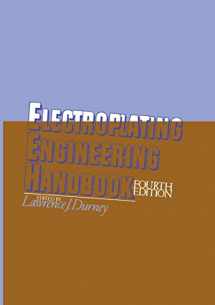
Electroplating Engineering Handbook
ISBN-13:
9781461295877
ISBN-10:
1461295874
Edition:
4th ed. 1985. Softcover reprint of the original 4th ed. 1996
Author:
L.J. Durney
Publication date:
2011
Publisher:
Springer
Format:
Paperback
800 pages
Category:
Chemical
,
Engineering
,
Industrial & Technical
,
Chemistry
FREE US shipping
Book details
ISBN-13:
9781461295877
ISBN-10:
1461295874
Edition:
4th ed. 1985. Softcover reprint of the original 4th ed. 1996
Author:
L.J. Durney
Publication date:
2011
Publisher:
Springer
Format:
Paperback
800 pages
Category:
Chemical
,
Engineering
,
Industrial & Technical
,
Chemistry
Summary
Electroplating Engineering Handbook (ISBN-13: 9781461295877 and ISBN-10: 1461295874), written by authors
L.J. Durney, was published by Springer in 2011.
With an overall rating of 4.0 stars, it's a notable title among other
Chemical
(Engineering, Industrial & Technical, Chemistry) books. You can easily purchase or rent Electroplating Engineering Handbook (Paperback) from BooksRun,
along with many other new and used
Chemical
books
and textbooks.
And, if you're looking to sell your copy, our current buyback offer is $0.3.
Description
As an instructor in various finishing courses, I have frequently made the statement over the years that "In the field of metal finishing there is very little black and white, just a great deal of grey. It is the purpose of the instructor to familiarize the student with the beacons that will guide him through this fog. " To a very considerable extent, a handbook such as this serves a similar purpose. It is also subject to similar limitations. Providing all the required information would result in a multi-volume encyclopedia rather than a usable handbook. In the pages that follow, you will therefore find frequent references to other sources where more detailed explanations or information can be found. The present goal is proper guidance and the provision ofthe most frequently required facts, not everything that is available. In the 13 years since the last edition, changes in the finishing industry have been profound but in one sense have resulted in simplifying matters rather than complicating them. Because technology has advanced to a level of complexity rendering "home brew" impracti cal in many cases, dependence on proprietary compounds has become common. Therefore, detailed solution compositions are often no longer significant or even practical. It is thus more important to provide instruction about the factors that affect the choice of the most suitable type of proprietary material.


We would LOVE it if you could help us and other readers by reviewing the book
Book review

Congratulations! We have received your book review.
{user}
{createdAt}
by {truncated_author}


